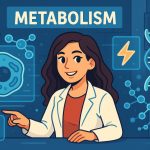Caffeine is one of the most widely consumed psychoactive substances on the planet. Found naturally in coffee beans, tea leaves, cacao pods, and even some fruits, it has been part of human culture for centuries. Whether through a morning cup of coffee, an afternoon tea, or an energy drink, caffeine fuels billions of people every day. But what exactly does it do to the human body? And why is this seemingly simple molecule both celebrated for its benefits and questioned for its risks? The science behind caffeine reveals a delicate balance between stimulation and overuse, alertness and addiction.
The Chemistry and Function of Caffeine
Caffeine belongs to a class of compounds known as xanthines, which act as stimulants in the central nervous system. It works primarily by blocking the effects of adenosine, a neurotransmitter that promotes sleep and relaxation. Normally, as adenosine builds up in the brain during the day, it signals the body to slow down and rest. When caffeine binds to adenosine receptors instead, it prevents that signal — keeping neurons firing and you feeling awake. This also triggers a mild increase in dopamine and norepinephrine, chemicals associated with alertness and focus. The effect begins within 15 to 45 minutes of consumption and can last several hours, depending on metabolism and tolerance.
The Benefits of Caffeine Consumption
Moderate caffeine intake can enhance mental performance and concentration. Studies show it improves reaction time, memory, and mood, especially during fatigue. Athletes benefit from caffeine’s ability to increase endurance and reduce perceived effort during exercise. Nutritionists like Dr. Astrid Nehlig note that caffeine also stimulates metabolism, helping the body burn fat more efficiently during physical activity. Furthermore, long-term studies have linked moderate coffee consumption with a reduced risk of certain diseases, including Parkinson’s disease, Alzheimer’s disease, and type 2 diabetes. However, experts emphasize that these benefits depend on moderate consumption — usually no more than 400 milligrams per day, or about four cups of coffee.
The Risks and Side Effects of Caffeine
Despite its popularity, caffeine is not without drawbacks. Because it blocks adenosine, excessive intake can interfere with sleep quality, leading to insomnia or restlessness. It also raises heart rate and blood pressure, which may pose risks for people with cardiovascular conditions. Over time, the body builds tolerance, requiring higher doses to achieve the same effects. Abruptly stopping caffeine after regular use can cause withdrawal symptoms, including headaches, irritability, and fatigue. Experts like Dr. Matthew Walker, author of Why We Sleep, caution that caffeine’s half-life — the time it takes for the body to eliminate half of it — can range from 4 to 6 hours, meaning that an afternoon coffee might still affect sleep at night.
How Caffeine Affects Different People
Caffeine’s impact varies widely based on genetics, age, and lifestyle. Some people metabolize caffeine quickly due to variations in the CYP1A2 gene, allowing them to enjoy multiple cups without side effects, while others experience jitters after just one serving. Pregnant women, children, and individuals with anxiety disorders are particularly sensitive to caffeine. Cultural habits also influence consumption: while coffee dominates in Western countries, tea is the preferred caffeinated beverage in Asia, and yerba mate plays a similar role in South America. These differences show that caffeine is not a one-size-fits-all substance but one that interacts uniquely with each body.
The Psychology of Caffeine Dependence
Caffeine is technically non-addictive in the medical sense because it doesn’t produce extreme cravings or impair social functioning, but it can cause dependence. People often rely on it to start their day or overcome fatigue, and its absence can feel uncomfortable. Psychologists note that caffeine dependence is more behavioral than chemical — it becomes ritualized through habits like the morning coffee routine. However, experts advise taking “caffeine holidays” to reset sensitivity and avoid escalation of tolerance. This approach helps maintain caffeine’s positive effects without falling into dependency patterns.
Expert Opinions on Responsible Use
Health experts generally agree that caffeine, when used wisely, is safe and even beneficial. Dr. Rob van Dam of Harvard University explains, “Caffeine is one of the few psychoactive substances that enhances cognitive performance without significant health risks, provided consumption stays moderate.” On the other hand, Dr. Charles Czeisler, a sleep scientist at Harvard Medical School, warns that chronic sleep loss caused by late-day caffeine is “a silent epidemic of modern life.” Their combined views highlight that balance — not abstinence — is key to reaping caffeine’s benefits while avoiding its pitfalls.
The Future of Caffeine Science
Modern research is exploring new frontiers of caffeine’s potential. Scientists are investigating synthetic analogs that mimic caffeine’s alertness-boosting properties without disturbing sleep. Caffeine is also being studied for its role in protecting brain cells from oxidative stress, which may help delay neurodegenerative diseases. At the same time, food technologists are creating caffeine-infused products — from chocolate to chewing gum — designed for controlled energy release. As society becomes more aware of sleep and mental health, the goal is not to eliminate caffeine but to integrate it more intelligently into human lifestyles.
Interesting Facts
- About 80% of the world’s population consumes caffeine daily.
- Caffeine was first isolated in 1820 by the German chemist Friedlieb Runge.
- A single espresso shot contains about 63 mg of caffeine, while an average cup of coffee has 95 mg.
- Decaffeinated coffee still contains small amounts — usually 2 to 5 mg per cup.
- Caffeine can even be found in plants as a natural pesticide, protecting them from insects.
Glossary
- Adenosine – A brain chemical that promotes sleep and relaxation.
- Neurotransmitter – A molecule that transmits signals between nerve cells in the brain.
- Dopamine – A neurotransmitter associated with pleasure, motivation, and alertness.
- Xanthine – A chemical compound group that includes caffeine and related stimulants.
- Metabolism – The body’s process of converting food and substances into energy.
- CYP1A2 Gene – A gene responsible for regulating how quickly the body metabolizes caffeine.
- Withdrawal Symptoms – Physical and psychological effects that occur when a substance is reduced or stopped after habitual use.
- Oxidative Stress – Cellular damage caused by free radicals, linked to aging and disease.
- Half-Life – The time required for the concentration of a substance in the body to decrease by half.
- Endurance – The ability to sustain prolonged physical or mental effort.


